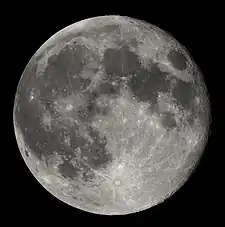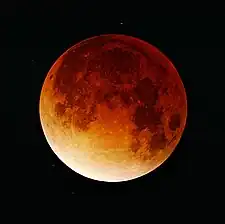Mond
Alemannic German
Central Franconian
Alternative forms
- Muund (rare variant in Moselle Franconian)
Etymology
From a conflation of Old High German māno (from Proto-Germanic *mēnô) and mānōd (from Proto-Germanic *mēnōþs), both from Proto-Indo-European *mḗh₁n̥s.
Pronunciation
- IPA(key): /mɔːnt/
Noun
German

Der Mond von der Erde aus — The Moon as seen from Earth (1)

Der Mond während einer totalen Mondfinsternis — The Moon during a total lunar eclipse (1)
Etymology
From Middle High German māne, from Old High German māno, from Proto-West Germanic *mānō. Later forms of the Middle High German word, mānde, had a final dental due to confusion with mānōt (“month”) (modern Monat).
Cognates
See also Dutch maan, English moon, Swedish måne, Icelandic máni; also Monat.
Further Indo-European cognates: Latin mēnsis (“month”), Ancient Greek μήν (mḗn, “month”), Sanskrit मास (māsa, “moon”), Russian месяц (mesjac, “moon; month”), Lithuanian mėnulis, Persian ماه (mâh, “moon, month”), Tocharian A mañPronunciation
- IPA(key): /moːnt/
audio (Germany) (file) audio (Austria) (file)
Proper noun
der Mond m (proper noun, strong, usually definite, definite genitive des Mondes or des Monds)
Declension
Noun
Mond m (strong, genitive Mondes or Monds, plural Monde)
- (astronomy) moon (a natural satellite that is orbiting its corresponding planet)
- Ganymed ist der größte Mond des Sonnensystems.
- Ganymede is the biggest moon of the Solar System.
- Merkur und Venus haben keine natürlichen Monde.
- Mercury and Venus do not possess natural moons.
- (literary, dated) a month, especially a lunar month
- (heraldry) moon (often used to describe a crescent)
Declension
Declension of Mond [masculine, strong]
Old Declension: This old declension is not used anymore, but was up until the end of the 18th century.
Hypernyms
Derived terms
- Blutmond
- Dreiviertelmond
- Halbmond
- Mondaufgang
- Mondauto
- Mondfähre
- Mondfahrzeug
- Mondfinsternis
- Mondfisch
- Mondgesicht
- Mondkalender
- Mondlandschaft
- Mondlandschaft
- Mondlandung
- mondlos
- Mondschein
- Mondsichel
- mondsüchtig
- Monduntergang
- Neumond
- Vollmond
Further reading
- “Mond” in Digitales Wörterbuch der deutschen Sprache
- “Mond” in Uni Leipzig: Wortschatz-Lexikon
- “Mond” in Duden online
 Mond on the German Wikipedia.Wikipedia de
Mond on the German Wikipedia.Wikipedia de
Hunsrik
Etymology
From Middle High German māne, from Old High German māno.
Pronunciation
- IPA(key): /moːnt/
Further reading
This article is issued from Wiktionary. The text is licensed under Creative Commons - Attribution - Sharealike. Additional terms may apply for the media files.